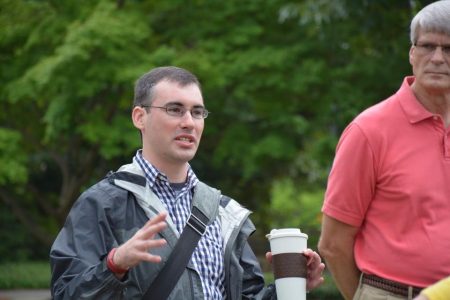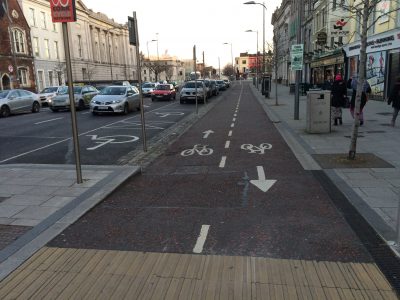Post contributed by Hallie Nelson, Office of Sustainability Intern

Jeff gives a talk at Auburn’s Bike to Work event.
How did you get to your office or class today? Most people have a morning commute route that doesn’t change much from day-to-day. I know I do. I travel straight down Opelika Road, turn onto Glenn, and head toward Donahue. Along the way, I pass Tiger Transit riders, walkers, and bikers who share the same routes I do. This concept of one roadway serving multiple modes of transportation is the focus of Dr. Jeff LaMondia, a professor in the Department of Civil Engineering at Auburn.
“Transportation is the key that links societal wellbeing, equity, economic development, and urban growth,” according to Jeff. He has been able to work at this intersection of the sustainability compass for his entire career, starting with an undergraduate “Rail to Trail” project at the University of Connecticut. Next, he moved to Austin, Texas, where he continued to study and get excited about cycling and other alternate modes of transportation. He says it has been a privilege to turn a topic he got excited about as an undergraduate student into a career.
Jeff’s goal while working on a project is to design a system that works now, while also having the foresight to support the needs of future populations without limiting them. This includes concepts of equity, nature, and wellbeing for the road users. Equity is addressed through providing transportation options for users that do not own cars or cannot drive; pollution is avoided by providing clean transportation options; and wellbeing is achieved through designing streets that encourage walking and biking.
As an avid cyclist, much of Jeff’s work focuses on improving perceptions about cycling. The Alabama Department of Transportation (DOT) is funding his research on changing behaviors and interactions on the roads. It is important to understand the interactions between cars and bikes in order to create safe road conditions for everyone. A complete street is designed for all types of users, whether cars, motorcycles, bicycles, or walkers, and their successful design begins with asking how people will use the street and what they are using it for. Using complete streets as a design solution can help improve these interactions.
Alabama is set to become a national leader in sustainable transportation planning. With the support of the DOT and the local leadership in Auburn, Opelika, and Birmingham, a lot of progress will be made. These groups and others are partnering across the state to plan cycling networks, and their work has been presented at the Transportation Research Board Conference. Jeff has enjoyed being a part of all of these exciting projects and says, “Auburn has been an awesome place to start work because of the great relationship with the city.”

Examples of complete street designs can be found around the world, like this one in Dublin, Ireland.
As Alabama emerges as a national leader, some of the foreseeable challenges include cost and leadership. Creating complete streets is a costly project, though it has great returns in improving the transportation system for all users. Alabama looks to overcome the cost limits by retrofitting old streets in residential areas to encourage bikes or transit rides. This will help move the plans forward without having to change the funding a whole lot. Strong leaders will also be needed to push these ideas forward. Jeff believes we have the necessary regional and state motivation to accomplish many projects, including the Metro Planning Organization in Auburn and Opelika.
Of course, one of the most important parts of transportation planning is the user. So, you have a major part in the success of these projects. Jeff suggests opening yourself up to trying new modes of transportation. If you’ve never tried walking from your apartment to campus, tomorrow might be a good day to start. If you’re intimidated by the complexity of Tiger Transit maps, then ask a friend who rides to help you figure out your route and give it a try. You can also become an advocate for these initiatives, even if you aren’t an avid cyclist or transportation engineer like Jeff. He encourages people to help push these initiatives through at the local level, even if you aren’t going to use them yourself because transportation is about building options for everyone to use.
If you are looking to learn more about sustainable transportation, Dr. LaMondia teaches two classes in the Department of Civil Engineering. Geometric Design focuses on designing roadways, and has worked with the City of Auburn to analyze streets that could easily incorporate bike lanes. His Sustainable Multimodal Transportation and Planning course takes a software approach to understand what people want in a transportation system. You can learn to use the software and forecast people’s actions into the future in order to plan a more sustainable city.
From professor at Auburn University to bicycle advocate on various committees, Jeff LaMondia is the type of person that you meet and wonder how he does it all. He has dedicated his career improving the quality for students and residents through transportation solutions. His contributions are a big reason why multimodal transportation is emerging across the state.




